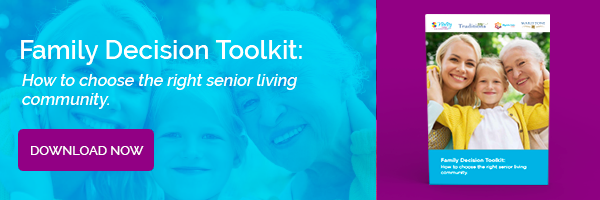Admitting a parent is showing signs of what may be dementia can be difficult. It is natural for loved ones to worry about their senior loved one’s feelings and about protecting their dignity. These are a few of the reasons families often deny there is a problem until the disease has progressed to the point where it can’t be ignored.
Equally important to protecting a senior’s dignity, however, is creating a plan to keep them safe. While your loved one may not need memory care at the moment, it’s good to educate yourself so you can make informed decisions if and when the time comes.
One step you can take is to learn about the senior care options available for today’s older Americans. There are far more options today than there were just 20 years ago.
Everyone Needs a Little Guidance
You may decide to quit your job and become a full-time caregiver. Or you might decide to hire outside help. Even if you suspect your loved one will be safer in a senior living community, there are different levels of care and a variety of different communities to choose from.
Here’s a mini-guide for anyone who’s facing important decisions about finding the best care for a loved one. You’ll want to be prepared and comfortable with your options as your older family member’s need for care changes.
A Guide to Today’s Senior Living Options
Today’s seniors can select from a range of options designed to support a variety of needs and lifestyles. This quick overview of the pros and cons of the different types of senior care can help you begin to better understand your choices.
Care at Home
- Family and friends can provide non-medical care at home or these services can be provided by a home care agency
- Skilled home health care (nursing and therapy) is another at-home care option if the senior meets Medicare’s criteria
- Pro: your loved one can remain in their present home
- Con: staying at home isn’t always cost-effective
- Con: non-licensed & bonded caregivers can present safety complications
- Con: caregivers may be different from week to week
- Con: 24/7 skilled care isn’t always feasible or affordable
Independent Living Community
- Senior-friendly villas or apartments
- Focus is typically on active lifestyle amenities versus medical care
- Pro: residents maintain much of their independence while enjoying a safe, senior-friendly environment
- Con: young children usually can’t visit for long periods of time
- Con: lack of generational diversity
- Con: there may be pet restrictions
Assisted Living Community
- Senior-friendly apartments or suites that come with a variety of services and support
- Pro: allows seniors to continue living a productive and fulfilling life, even when they can’t be 100 percent independent in their own home
- Pro: assistance with activities of daily living (ADLs), such as bathing and dressing
- Pro: medication management is usually available
- Pro: maintenance housekeeping and laundry are included
- Pro: veterans may qualify for benefits to help with the cost
- Con: there may be pet restrictions
- Con: only a few states allow Medicaid waivers to pay for assisted living
- Con: living in a community that is not age-diverse
Memory Care Program
- Care program designed to improve quality of life for people with Alzheimer’s disease or similar forms of dementia
- Pro: residents receive specialized care and therapies
- Pro: 24/7 care, safety, and security
- Pro: specialty dining programs to promote appetite
- Con: usually costs more than traditional assisted living
Telltale Signs That You May Need Help with Caregiving
It’s also important for family caregivers to know that everyone needs help. No one can assume this role completely on their own. If you don’t go in to your role accepting this, you might end up experiencing a case of caregiver burnout.
How do you know when it’s time to admit you need help with your caregiving challenges?
Here are a few of the signs to watch out for:
- You are constantly exhausted beyond what a good night’s rest can overcome
- Your loved one wanders or exhibits other difficult to manage behaviors
- Your own health is beginning to decline
- The strain of caregiving is putting your marriage at risk
- You are encountering problems at work as a result of your caregiver demands
- You can’t seem to find time to spend with your own children
A Resource for Transitioning to Senior Living
Finding the right level of services for your senior loved one can feel overwhelming. It’s one of the reasons we created a very special resource for seniors and their families.
Our complimentary Complete Guide to Choosing Between Senior Living Options e-book covers:
- What questions to ask potential senior care partners
- What options you have for financing
- How to frame the conversation when it comes time to talk to your senior loved one about moving
You can download and read our free guide today for help making informed decisions about your loved one’s care. And, as always, the team at Vitality Senior Living is happy to help answer any questions you might have. Call us today to learn more »




